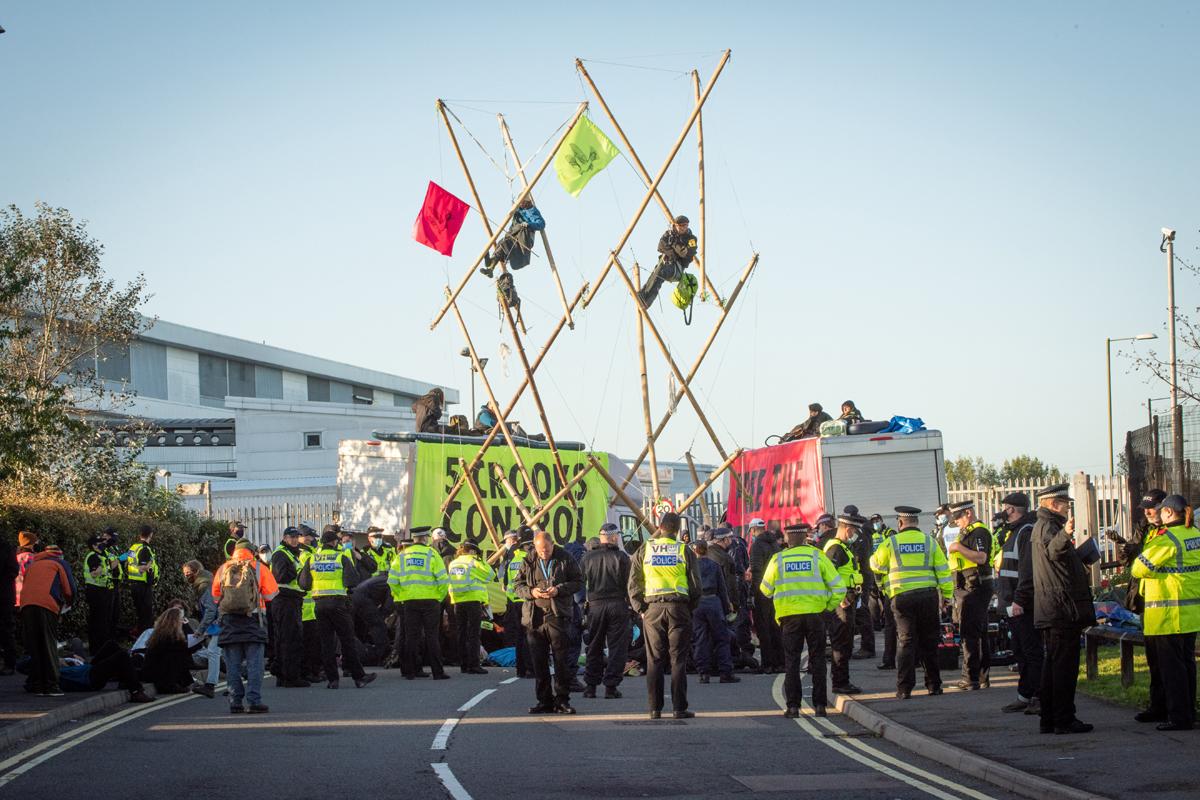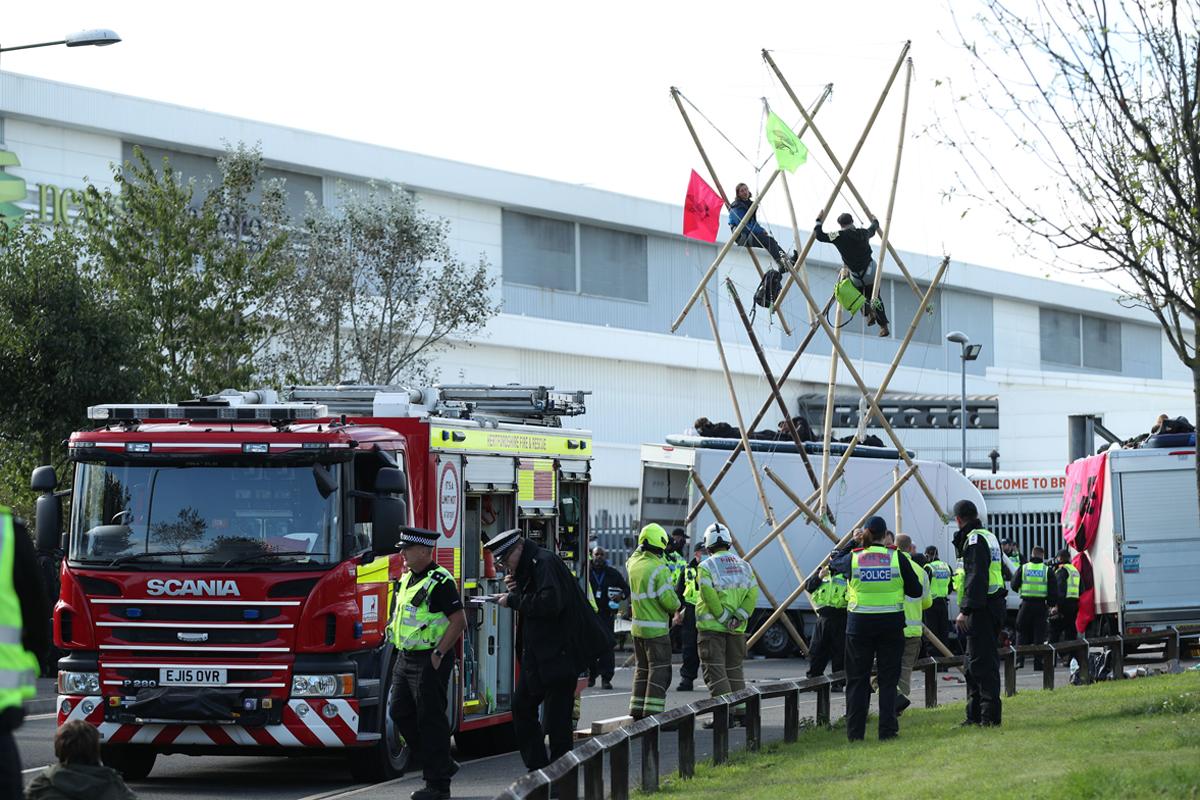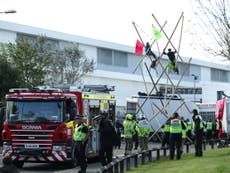Extinction Rebellion protesters should be acquitted after Priti Patel exerted ‘huge political pressure’ on police, court hears
Home secretary wanted ‘early intervention and removal’ of protesters blockading Rupert Murdoch-owned printworks
Priti Patel exerted “huge political pressure” on police over an Extinction Rebellion protest outside a Rupert Murdoch-owned printing works, a court has heard.
The home secretary personally contacted the chief constable of Hertfordshire Police and Metropolitan Police commissioner Cressida Dick over the blockade in September.
St Albans Magistrates’ Court heard that Ms Patel was seeking the “early intervention and removal of the protesters”, who were aiming to stop newspapers, including The Sun and the Daily Mail, being distributed.
Defence barristers argue that six demonstrators should be acquitted of highway obstruction because the home secretary had affected police decision-making and their balancing of conflicting human rights.
Making her closing submissions to the judge on Tuesday, Laura O’Brien said: “The police’s operational independence was severely undermined.”
Raj Chada, another defence barrister, said “huge political pressure” had caused a “rushed decision in relation to remove the protesters” now on trial.
Police officers have denied that their decisions were influenced, but Mr Chada told the court: “The idea that no political pressure was felt is not borne out by the totality of the evidence.”
District Judge Fudge said she would deliver her verdict on 16 July and released the defendants on bail.
The home secretary publicly condemned the demonstration at the time, calling it an “attack on our free press” and “completely unacceptable”, and dozens of activists have since been prosecuted.
The trial previously heard that a review of the police operation highlighted the “volume of contact” between the home secretary and chief constable.
“Political contact from government ministers needs to be carefully considered in future to avoid decision-making falling outside our recognised command structures,” a report added.
The court heard that Ms Patel was alerted to the protest by contacts within the media, and first contacted chief constable Charlie Hall shortly after 11.30pm on 4 September.

At some point before midnight, the home secretary had also spoken to Dame Cressida, and the Metropolitan Police later sent officers to assist with the operation.
Mr Hall told his deputy, assistant chief constable Owen Wetherill, that Ms Patel was “seeking early intervention and removal of the protesters” and news of her interest filtered down to other officers.
Mr Wetherill, who was gold commander for the protest, recorded the decision to forcibly remove protesters shortly after 1.30am and said he had not been influenced.
But defence barristers said a Home Office official had emailed police 50 minutes earlier saying Ms Patel was “keen to know” when protesters had been removed.
Mr Chada told the court: “There is clearly some sort of common understanding that protesters are going to be removed.”
He said there was no evidence that Mr Wetherill had received any information from officers on the ground when he made the decision to remove protesters, and he did not know they had agreed to leave voluntarily at 10am.
The court heard that the operation to detach them from vehicles and bamboo structures took until 11am, when the remaining demonstrators released themselves.
At 4.45am, Mr Hall asked Mr Wetherill if the removal operation could be “expedited” following another call with the home secretary, who had been in contact “through the night”.
Specialist officers said it was not possible to work faster, but Mr Chada said: “There were efforts by the home secretary to seek earlier removal and that the police sought to facilitate that.”

Defendant Amir Jones, a former civil servant who is representing himself, said the evidence “suggests there was already an agreement between the Home Office and police to remove protesters before the decision was recorded”.
He added: “We know on the night that there was political pressure on police.”
Ms O’Brien said Ms Patel had made clear that she wanted the blockade ended “faster and quicker”, adding: “The involvement at a very early stage by the home secretary significantly undermines the balancing exercise [of human rights].
“What was clear from within an hour of the protest starting is that the home secretary wanted to know not only what’s going on but how it is being done. It’s very clear what the home secretary’s expectation was.”
Ms O’Brien said that, even if it was unintentional, Mr Patel had influenced officers’ consideration of alternative responses to the protest.
“You cannot be sure that a conviction in this case would be proportionate and you should acquit the defendants,” she told the judge.
The defence barristers argued that a recent Supreme Court ruling that protest can be a lawful excuse to block roads must be taken into account.
On Monday, the prosecution argued that the defendants should be found guilty of highway obstruction and that “political interest” by the home secretary did not amount to political pressure.
“The protest was not proportionate in the circumstances – it was not carefully targeted, it lasted far longer than was necessary,” prosecutor Nigel Ogborne said.
“The police were not breaching the rights of these defendants by arresting them and their arrest and removal was proportionate.
“The actions of the police were not in any way influenced by the decisions of politicians.”
He told the court that the eight-hour blockade of the Newsprinters site in Broxbourne, using vehicles and bamboo structures, stopped employees from driving home and affected newspaper distribution to 30,000 retailers.
The case concerns the second group of defendants, who have been charged with obstructing a highway at the protest.
The first group of six were convicted in May, after a separate trial that was not presented with evidence of Ms Patel’s involvement.
Caspar Hughes, 49, of Exeter, Elise Yarde, 32, of Walthamstow, Amir Jones, 39, of London, Laura Frandsen, 30, of London, Charlotte Kirin, 51, of Bury St Edmunds and Hazel Steson, 56, of Bury St Edmonds, deny all charges.




